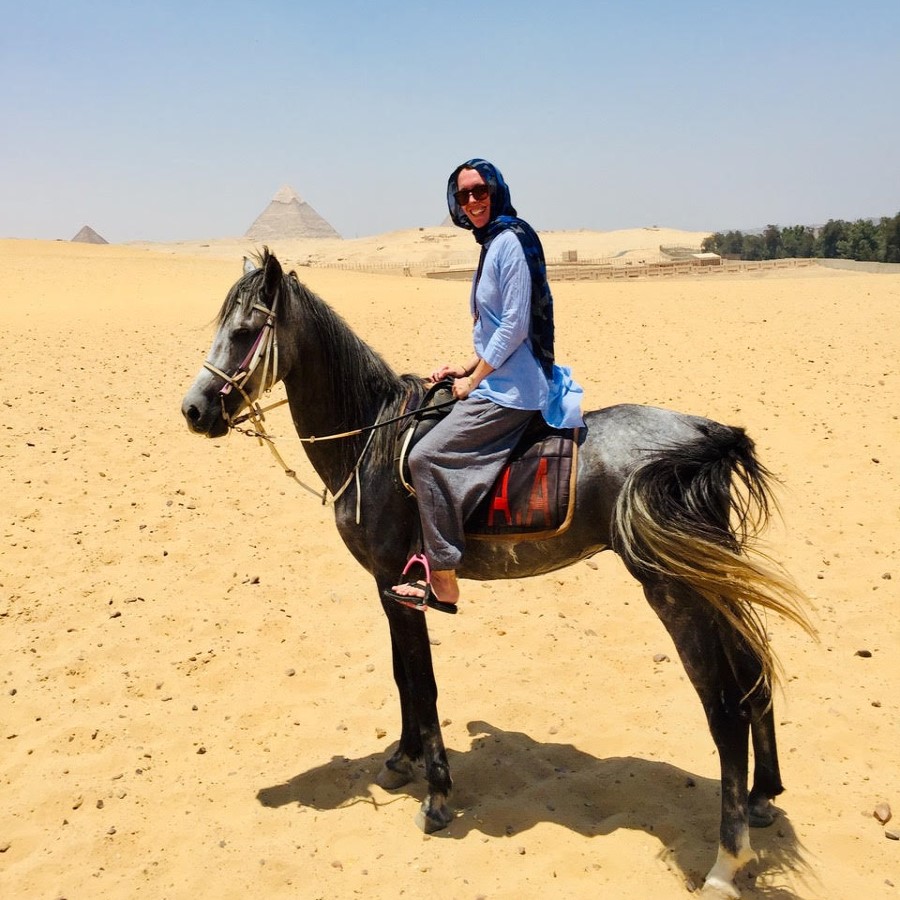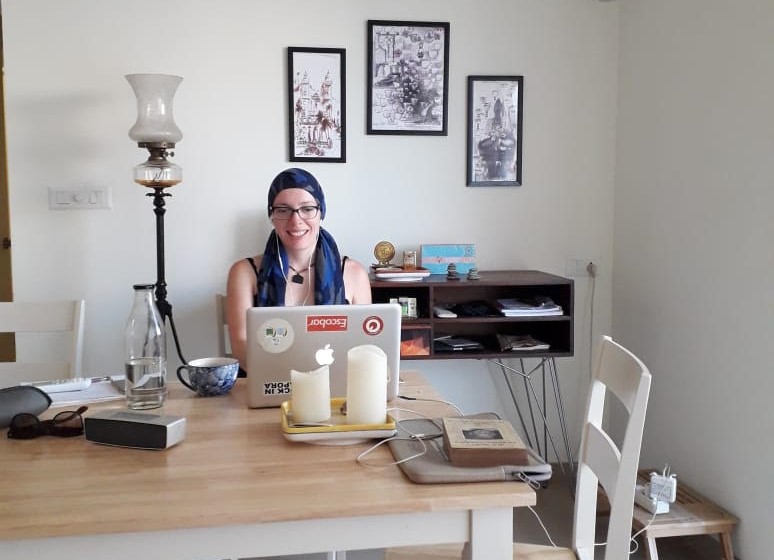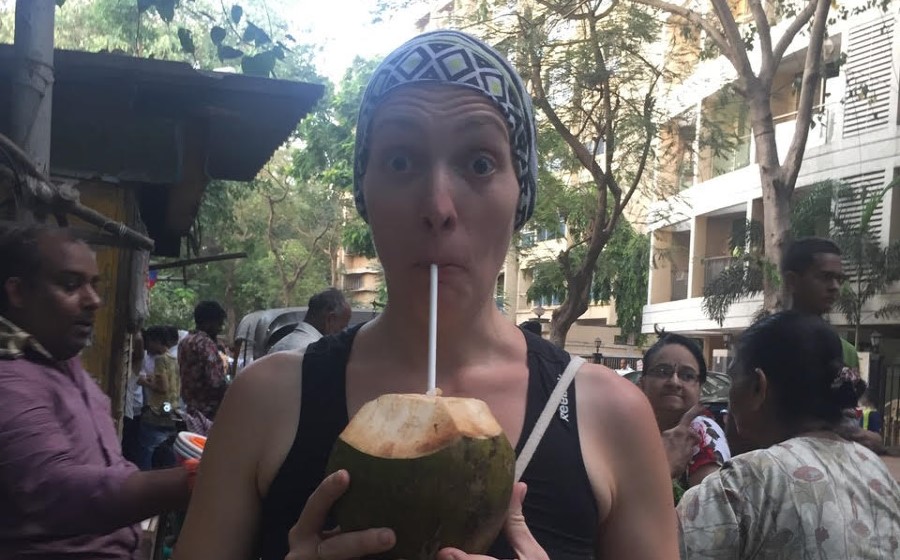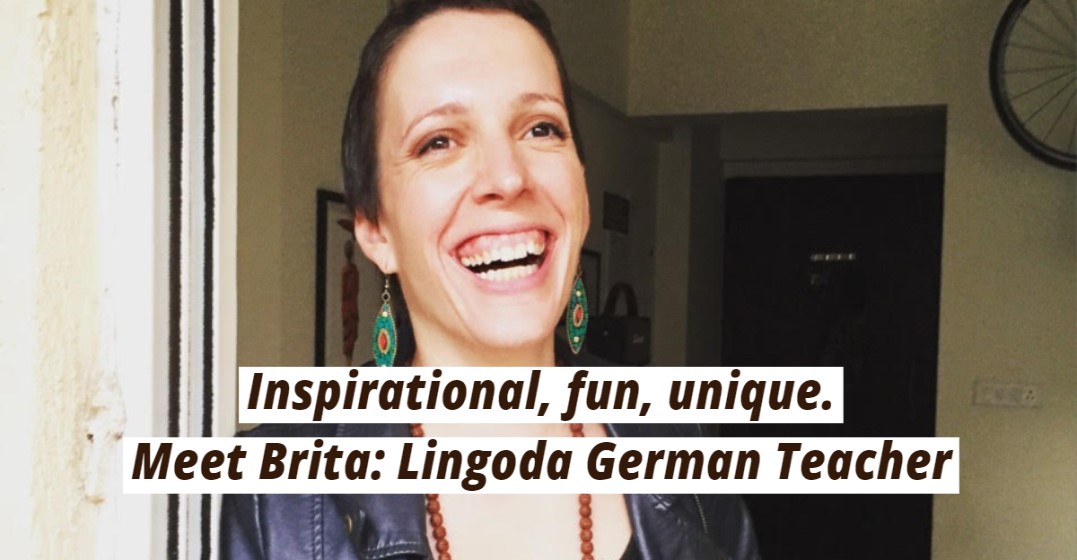Meet Brilliant Brita: Lingoda Teacher Extraordinaire
Published on August 15, 2019 / Updated on January 9, 2024
You may have met Brita before, perhaps in a Lingoda class, or maybe you’ve read some of her blogs! Either way, Brita is an inspiration to her students, and everyone she comes across. Free-spirited, open and curious, Brita is the perfect Lingoda teacher! Read on to find out more about why she loves the German language and online teaching.
Where to start and where to end ! Maybe I am a multi-potentialist. I heard this term recently in a Ted talk. I am 35 years old. Was brought up in central Germany in a quiet rural but beautiful area not far from the airport in Frankfurt am Main and then moved to Berlin to live and study for 10 years. I studied different subjects until I realised that German and Philosophy are my match. While I was still studying, I left for 6 months to live and teach in a boarding school in rural Namibia. It was 80km distance through no mans land to the next town with supermarket. I think this was one of the first extremely challenging experiences in my life. I feel like it all started there. After two days I wanted to leave and go back into safe mode in Germany. But I fought through it! I learned so much about different cultures and about myself. I then came back to Germany and left a few weeks later to Guatemala.
Finally, I packed my bags to go on my journey into the world. I have been travelling since beginning of 2017 and started teaching with Lingoda at the end of 2017. In all this, India took my heart. Not only because it is so great but because it kicks you out of your own comfort zone every day, every minute. And that means expansion. With Lingoda I was able to go on teaching and follow my passion. India and all other countries offered me a philosophical expansion (into Yoga, which is much more than just physical exercise) and a changed and altered world view. Currently, I am in the middle of the jungle above Rishikesh in the North of India. It is a beautiful and tranquil place, only reachable if you trek 3,5km through the mountains. But you get rewarded to stay right beside the holy river Ganga. And guess what, the Internet is more stable here than in town ;)!
Not yet the whole world! I have lived in Namibia and India. I stayed in France, Switzerland, Austria, Netherlands, UK, Ireland, Hungary, Italy, Sri Lanka, Thailand, Guatemala, US, Egypt, Nepal and I hope many other countries will follow. I would love to explore more of Africa and South America.

I wake up in the morning, usually around 6.30/7am and sit still with myself and breathe for a little while. Then I do a little bit of Yoga Asanas and have a cup of tea afterwards. That’s my ritual everyday, no matter if I work or not. After that I am ready for breakfast or my first class. It always depends how I feel and where I am. I’ll eat and set up everything for work. I prepare water or tea, my notes, prepare the classes or get my notes from the previous days preparation. And then I await my students. Also depending on where I am and how my situation is, I will plan new classes.
I have days with back to back classes or sometimes days can be quite varied depending on how reliable my surrounding and wifi is and what other work I have to do. I usually go and feed or hang with some street dogs in my free time. I find that I can learn a lot from these souls. So I become a student in my breaks from being a teacher!
Philosophical question: Is there actually student and teacher? 😉 I noticed at my time working with Lingoda, that I provide or activate knowledge in others but the same happens vice versa. I learn so much about different cultures, different personalities in my classes, things I never anticipated beforehand that I often feel like a student too, with my students being my teachers.

Very good question! I can answer this quite vivid, because I really want to learn Hindi and it is not as easy as German, Spanish, English or French (and not available at Lingoda! ). Living with people who are not speaking my language is a challenge. Not only because you cannot communicate for the very basic things but also because understanding the culture is more complex.
I have taken some Hindi classes now and so many things make so much more sense. Even the Indian English makes more sense, knowing that the Hindi sentence structure is very different from the European one. Even though there are also similarities. It is a whole new world that opens up to you if you start learning a language. And I mean not only its words but its tonality, its melody, its beauty. You then can even see the differences in the culture within the country of the language you are learning. You can see the variations of the dialects and often they symbolise a vital part of the cultural distinction. Sneaking into Afrikaans while I was living in Africa offered me a good insight into the cultural heritage of the apartheid and how language merges with the culture. It was fascinating to see the difference to the tribe languages. Language in general is alive and vivid. It is ever changing. A little like us as well. 🙂
Having seen other platforms out of a students perspective I really enjoy Lingoda as a teacher. First of all the learning approach is great. Also having the chance to learn in a group setting is amazing. Being connected to people all over the world and learning together gives, besides learning a language, so much more.
I love the spontaneity. I am flexible in booking my classes and the preparation of the class is so much fun. I always prefer the philosophy classes, my heart lies there but all class types are well structured. And I am personally in love with zoom (the platform Lingoda uses). As said, compared to other platforms, zoom works flawless, it is very user friendly. After studying German, I was a little bored of the material out there. When I taught in the bush of Namibia, I created my own material most of the time, but I really love Lingoda’s materials.
Because it expands your mind, your consciousness and gives you amazing brain-enhancing skills as well. It opens doors to different worlds and is so much fun! It is a little like doing sports. Once you got over your inner pig dog (der innere Schweinehund… I looooove German!), it becomes more easy and you can see and feel the results almost immediately.
I love that German expressions are so literal. Learning Latin in school helped me so much to even see this tight structure in word creation in German. Basically, you can express EVERYTHING in German. There is no limit. If you do not have an expression for something, just create it out of its literal meaning. For example, there is the egg-opener. But the way it is named in German is just lovely. Here you see the chances of Komposita in this language. The name is: Eierschalensollbruchstellenverursacher. Besides that this word is crazily long, it exactly describes, what the tool is doing to the egg. It would be translated into English like that: Eierschale (“egg shell”) + Sollbruchstelle (“predetermined breaking point”) + Verursacher (“causer”).
How cool is that? This is just one example of expression. Being mostly in their mind, German is rational and has a broad expression on feelings and thoughts and everything non-material as well. The possibilities in the German language are infinite.

Growing up in Germany and then discovering other parts of the globe gives let me think from the reverse answer of your question. Germany has something very interesting. Something, I would describe with “unbearable structure and rationalism”. You can see that not only in the vocabulary of German which often could not be more descriptive. It just all seems to make sense there. It is all so well thought through. The silence always gets me every time. How do Germans do this? You live in a huge city and it still is so silent and peaceful in the night.
Besides this structure and “everything is at its place”-way of life, Germany also has a lot of subculture that is exactly challenging these norms. Constantly asking questions, re-inventing itself. Whenever I come back to good ol’ Germany, I visit the south but also always the northeast. The contrast in people and in this very structure and its subculture is quite fascinating. Not to talk about the rich culture and history and the food *yummm*.
Train your language muscles! Learning a language does not have to be static. We learn in school how to follow teachers and advises. How to learn our vocabulary and grammar. But we often do not learn that language is alive. It has a heartbeat and it matches our heartbeat much faster and easier if we learn it with fun! Fun and ease. So please, be silly sometimes in your classes. Joke and connect the learning to situations outside of your classroom. You will remember everything much better.
Language is far more than just “language”. Every language is a key to a different culture, a different mindset and a different wisdom. Every language has its own tone, its own philosophy and expression. Studying languages is like studying the philosophy of a country, or rather its people. I see it here in India. It is a country with so many different languages and all of those languages, all of their expressions are matched to the certain needs and cultural habitat. It is the same with travelling. You dive into different cultures and expressions. They will challenge your current view and then ultimately expand it.
If you’d like to explore the wonderful German language, and meet native speaking teachers like Brita, head over to our website and start your journey today.
